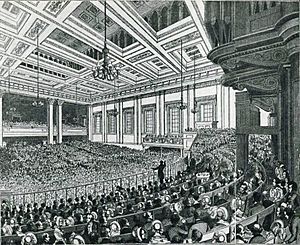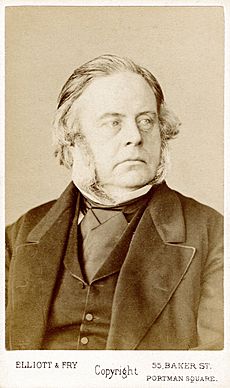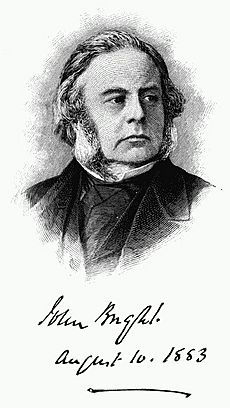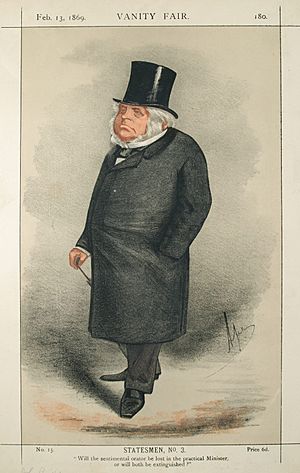John Bright facts for kids
Quick facts for kids
John Bright
|
|
|---|---|
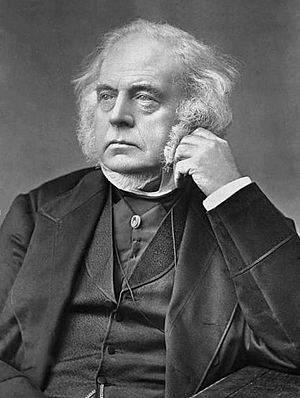
John Bright in the 1870s
|
|
| President of the Board of Trade | |
| In office 9 December 1868 – 14 January 1871 |
|
| Monarch | Victoria |
| Prime Minister | William Ewart Gladstone |
| Preceded by | The Duke of Richmond |
| Succeeded by | Chichester Parkinson-Fortescue |
| Chancellor of the Duchy of Lancaster | |
| In office 30 September 1873 – 17 February 1874 |
|
| Monarch | Victoria |
| Prime Minister | William Ewart Gladstone |
| Preceded by | Hugh Childers |
| Succeeded by | Thomas Edward Taylor |
| In office 28 April 1880 – 25 July 1882 |
|
| Monarch | Victoria |
| Prime Minister | William Ewart Gladstone |
| Preceded by | Thomas Edward Taylor |
| Succeeded by | The Earl of Kimberley |
| Parliamentary offices | |
| 1843–1847 | Member of Parliament for City of Durham |
| 1847–1857 | Member of Parliament for Manchester |
| 1857–1885 | Member of Parliament for Birmingham |
| 1869–1870 | Member of the Legislative Assembly of Queensland for Kennedy |
| 1885–1889 | Member of Parliament for Birmingham Central |
| Personal details | |
| Born | 16 November 1811 Rochdale, Lancashire, England, United Kingdom |
| Died | 27 March 1889 (aged 77) Rochdale, Lancashire, England, United Kingdom |
| Political party | Liberal Unionist (1886-89) Liberal (1859-86) Radical (until 1859) |
| Spouses |
|
John Bright (born November 16, 1811 – died March 27, 1889) was an important British politician. He was known as a Radical and Liberal statesman. He was one of the best speakers of his time. Bright strongly supported free trade policies. This meant he wanted to remove taxes on goods traded between countries.
Bright was a Quaker, a Christian group known for its peaceful beliefs. He is most famous for fighting against the Corn Laws. These laws made food expensive in Britain. Working with Richard Cobden, Bright started the Anti-Corn Law League. Their goal was to get rid of these laws. They succeeded in 1846. Bright also worked with Cobden on another free trade agreement. This was the Cobden–Chevalier Treaty of 1860. It helped Britain and France trade more easily.
Bright was a member of the House of Commons from 1843 to 1889. He pushed for free trade, changes to voting rules, and religious freedom. He was one of the few who spoke out against the Crimean War. He also disagreed with William Ewart Gladstone's plan for Home Rule for Ireland. Bright believed he spoke for the middle class. He was against the special rights of rich landowners. In Ireland, he wanted to end the special status of the Anglican Church. He also worked to give land to Catholic farmers. He is famous for saying "The mother of parliaments" when talking about the British Parliament.
Contents
John Bright's Early Life
John Bright was born in Rochdale, Lancashire, England. This area was a key place during the Industrial Revolution. His father, Jacob Bright, owned a cotton mill and was a respected Quaker. John was the oldest surviving son of eleven children. His younger brother, Jacob Bright, also became a Member of Parliament.
John was a quiet child. He went to several schools, including Ackworth School and Bootham School. He didn't learn much Latin or Greek. But he loved English literature, which his mother encouraged. He also enjoyed outdoor activities. At 16, he started working in his father's mill. Later, he became a partner in the business.
In Rochdale, Bright became involved in local politics. He fought against a local church tax. He also supported changes to how Parliament worked. Bright was a strong Nonconformist. This meant he was a Protestant who was not part of the Church of England.
Learning to Speak in Public
Bright first learned to speak in public with the Rochdale Juvenile Temperance Band. These young men gave speeches in villages. Bright once got his notes mixed up during a speech. The chairman told him to speak from his heart. Bright did, and though he started nervously, he gave a great speech.
He once asked a minister, John Aldis, for advice on public speaking. Aldis told him not to memorize whole speeches. Instead, he should memorize key parts and the ending. Bright called this his "first lesson in public speaking." At this time, he didn't plan to become a politician. He was a successful businessman. He enjoyed taking part in his town's social and political life. He helped start the Rochdale Literary and Philosophical Society.
Fighting for Fair Trade
Bright first met Richard Cobden around 1836. Cobden was a local leader in Manchester. Bright asked him to speak at an education meeting in Rochdale. Cobden was impressed by Bright's speech. He encouraged Bright to speak out against the Corn Laws.
Bright gave his first speech on the Corn Laws in 1838. That same year, he joined a group that formed the Anti-Corn Law League. This group wanted to get rid of the Corn Laws. These laws put taxes on imported grain. This made bread and other foods very expensive. The laws helped rich landowners but hurt ordinary people.
In 1839, Bright married Elizabeth Priestman. They had a daughter named Helen Priestman Bright. Sadly, Elizabeth died in 1841 from tuberculosis. Bright was very sad. Three days after her death, Cobden visited him. Cobden told him, "There are thousands of homes in England at this moment where wives, mothers and children are dying of hunger. Now, when the first paroxysm of your grief is past, I would advise you to come with me, and we will never rest till the Corn Laws are repealed." Bright agreed. From that day, they worked tirelessly to abolish the Corn Laws.
Bright and Cobden became the main leaders of the Anti-Corn Law League. Cobden was calm and logical. Bright was passionate and inspiring. Together, they traveled across England and Scotland. They spoke to huge crowds. Their speeches convinced many people to support free trade. In 1845, a bad harvest and a potato disease in Ireland made food shortages worse. This pushed the government to finally repeal the Corn Laws in 1846.
Bright in Parliament
In 1843, Bright became a Member of Parliament (MP) for Durham. He was known as Cobden's main partner. Other MPs were suspicious of him at first. Bright's first speech in Parliament was on August 7, 1843. He spoke about reducing import taxes. He told the House that he represented the Anti-Corn Law League.
Bright's speaking style was powerful. He was described as having a clear voice and a pleasing expression. He wore the simple clothes of a Quaker. His speeches became more and more popular outside Parliament. Inside Parliament, his progress was slower. But by 1845, his speeches, like the one on the Game Laws, earned him respect.
Bright and Cobden usually agreed on political issues. They only voted differently a few times. In 1845, Cobden faced money problems and thought about leaving public life. Bright convinced him to stay. He helped raise money to support Cobden. This showed how important their partnership was.
Famous Sayings
Bright is known for coining some famous phrases:
- "Flog a dead horse": This phrase means trying to do something that is impossible or useless. Bright used it in 1859 or 1867. He said trying to make Parliament care about reform was like trying to "flog a dead horse" to make it move.
- "England is the Mother of Parliaments": Bright said this on January 18, 1865, in a speech in Birmingham. He was supporting expanding voting rights. This phrase is often used to describe the British Parliament.
Marriage and Life in Manchester
Bright married Elizabeth Priestman in 1839. They had one daughter, Helen. Elizabeth died in 1841. In 1847, Bright married Margaret Elizabeth Leatham. They had seven children, including John Albert Bright and William Leatham Bright.
In 1847, Bright became an MP for Manchester. He continued to oppose laws that limited working hours. As a Nonconformist, he spoke against church control over education. He also spoke against the death penalty and military flogging. He supported reducing government spending and promoting peace.
Bright was re-elected for Manchester in 1852. He gave some of his most emotional speeches against the Crimean War. He was almost alone in opposing the war. In 1855, he gave a famous speech saying, "The angel of death has been abroad throughout the land. You may almost hear the beating of his wings." This speech deeply moved Parliament.
In 1860, Bright and Cobden had another success. They helped create the Cobden–Chevalier Treaty. This agreement made trade easier between Britain and France.
Representing Birmingham
In 1857, Bright lost his seat in Manchester. This was because of his unpopular views on the Crimean War. But a few months later, he was elected as an MP for Birmingham. He held this position for over 30 years.
In 1868, Bright joined the government of Prime Minister William Ewart Gladstone. He became President of the Board of Trade. But he resigned in 1870 due to poor health. He served two more times in Gladstone's government. He was Chancellor of the Duchy of Lancaster from 1873-74 and 1880-82. In 1882, he resigned again. This was because Gladstone ordered the navy to attack Alexandria in Egypt. Bright called it a "jobbers' war" for rich investors. He felt it was wrong.
Bright had a special connection to Llandudno in North Wales. In 1864, his five-year-old son died there. His son had asked to be buried in the local graveyard. Bright visited Llandudno every year until his own death. A school there, Ysgol John Bright, is named after him.
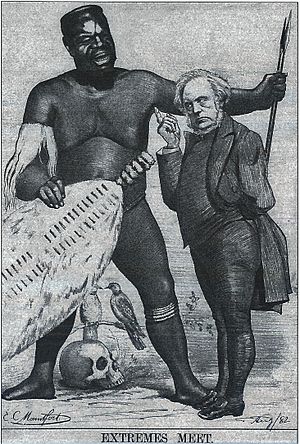
In his later years, Bright received many honors. He was elected Lord Rector of the University of Glasgow in 1880. He also received an honorary degree from the University of Oxford in 1886. A statue of him was put up in Birmingham in 1888. John Bright Street in Birmingham and the town of Bright in Australia are named after him.
Disagreement over Irish Home Rule
After the Great Irish Famine, Bright supported changes to land ownership in Ireland. He wanted to help Irish farmers. But later, he became worried about the idea of Ireland governing itself.
In 1886, Prime Minister Gladstone proposed "Home Rule" for Ireland. This meant Ireland would have its own parliament. Bright strongly opposed this plan. He believed it would break up the United Kingdom. He saw the Irish party pushing for Home Rule as "the rebel party."
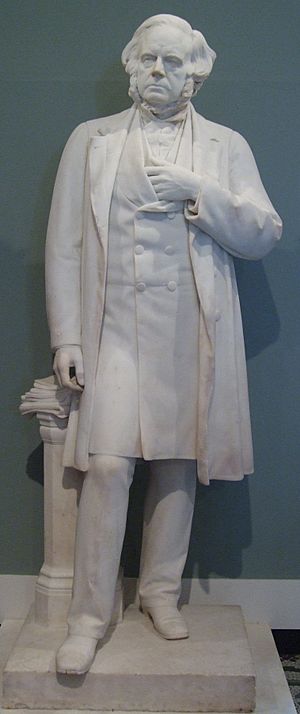
Bright was a very influential figure. Many politicians tried to get his support for Home Rule. But Bright remained firm. He believed that keeping the United Kingdom together was more important than the Liberal Party's unity. On June 7, 1886, the Home Rule Bill was defeated in Parliament. Bright voted against it.
Gladstone then called a new election. Bright gave only one speech during the campaign. He told his voters to put the Union first. Many believed his speech was a key reason why Gladstone's party lost the election. Bright was re-elected for Birmingham. He then sat with the Liberal Unionist Party, who were allied with the Conservatives. He did not speak much in Parliament after this. He never met Gladstone again, despite their long history together.
Death and Legacy
In late 1888, John Bright became very ill. He knew he was dying. He sent a message to Gladstone, saying he remembered Gladstone's kindness. Gladstone replied that his feelings for Bright had not changed.
Bright received many messages of sympathy, even from Queen Victoria. He died at his home on March 27, 1889. He was buried in the Quaker graveyard in Rochdale.
Memorials to John Bright
- The library at Bootham School, where he studied, is named after him.
- Princeton University Library has a collection of materials about John Bright.
- A street in Birmingham is named John Bright Street.
- His statue is in the Birmingham Museum and Art Gallery.
- Ysgol John Bright, a secondary school in Llandudno, North Wales, is named after him.
- The town of Bright in Australia is named in his honor.
Images for kids
-
Grade II listed statue in Albert Square, Manchester
-
Statue of John Bright in Broadfield Park, Rochdale, Lancashire
See also
 In Spanish: John Bright para niños
In Spanish: John Bright para niños
 | Victor J. Glover |
 | Yvonne Cagle |
 | Jeanette Epps |
 | Bernard A. Harris Jr. |


